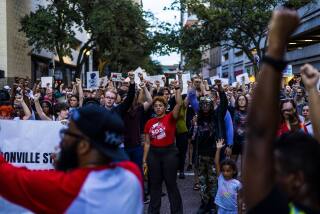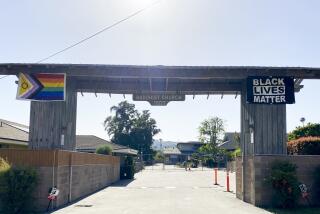Westminster Cross-Burner Gets 37 Months in Prison
- Share via
A Westminster man who fanned racial fears last summer when he burned a 4-foot, wooden cross in the yard of a neighboring black family was ordered Friday to spend 37 months in federal prison for the crime.
U.S. District Judge J. Spencer Letts, describing the offense as a blatant and heinous example of racial bigotry, opted for the harshest punishment that he could deliver against 24-year-old Gary Skillman under 1984 federal sentencing guidelines.
Skillman, who gave authorities several conflicting statements about the incident but declined to testify at his recent trial, told the judge before sentencing, “I have nothing to say.” He sat motionless throughout most of the proceeding in a Santa Ana courtroom.
Left to puzzle over the actions of a young man described as a white supremacist were Alvin and Lillie Heisser, the targets of the cross-burning.
“Why would someone do something like this? We’ve been trying to find an answer to that for over 200 years,” said Alvin Heisser, a past president of the Orange County chapter of the National Assn. for the Advancement of Colored People.
While satisfied with the judge’s sentence, Heisser said the painful memories “will never go away. It’ll be there forever--burning in you.”
The Heissers awakened in the pre-dawn hours of July 28 to the flickering light of the cross burning on the lawn of their home in the Indian Village section of Westminster.
That devastating sight, Alvin Heisser said after Friday’s sentencing, filled him with intense anger--and at the same time, a feeling of utter helplessness. “All I could do was watch it. I couldn’t do anything to stop it.”
Before the incident, the Heissers had been thinking of selling their Westminster home, since the children were all grown and they did not need such a large house. But the cross-burning changed their minds, because, as Lillie Heisser said, “I’ll die here before I let these crazy people run me out.”
Alvin and Lillie Heisser said they did not know Skillman and only seen him a few times around the neighborhood. He lived just a block away.
After the well-publicized incident, the family said it was overwhelmed with words of encouragement and support from friends and strangers alike in the area. Even members of self-described racist skinhead groups spoke out against the cross-burning, saying it did little to advance their cause of the establishment of a separate white state.
Federal prosecutors have described Skillman as a white supremacist who carried racist poems in his pockets and kept at his home other paraphernalia--such as a picture of a naked black man labeled with a racial epithet.
They pointed as well to Skillman’s association with skinheads, who espouse hatred of blacks and other minorities, and to his own statements at the time of his arrest--saying that he wanted to get blacks out of his neighborhood.
Assistant Public Defender Dean Steward tried unsuccessfully to convince the trial jury that Skillman was only a bystander in the affair who watched as other youths planted and burned the cross. The defendant did not testify.
But Assistant U.S. Atty. Thomas Umberg asserted that Skillman took an active role, working with a second man who is still being sought by authorities.
On Jan. 4, a federal jury took only 15 minutes to find Skillman guilty of conspiracy, using a fire for purposes of intimidation, and violating the civil rights of others.
By statute, the conviction could have carried a maximum sentence of 21 years in prison and a $600,000 fine against Skillman. But under federal sentencing guidelines that calculate the sentence by weighing a defendant’s criminal history and the seriousness of his crime, Skillman in effect faced a sentence of somewhere between 2 years and 37 months, according to Judge Letts and lawyers involved in the case.
Letts could have exceeded the 37-month maximum guideline--but only if he had documented extraordinary circumstances to justify such a rare action. Even then, the judge would have been exposing himself to the greater likelihood of having the sentence overturned on appeal, lawyers said.
‘Stuck With Guidelines’
And so, Letts said he was “stuck with the guidelines” as he granted the prosecutor’s request to impose the maximum recommended term. The prosecutor said such a sentence would send a message to Skillman and others who adhere to “the repugnant ideals of white supremacy.”
The once long-haired youth sat neatly dressed and shaved, wearing a short-sleeved shirt that partially showed a tattoo that prosecutors said reads “white power.”
Skillman, who has been incarcerated since his arrest last October, is to serve 3 years on probation after his release. But the judge declined to impose any fines against the indigent defendant.
Public defender Steward, who had sought a sentence of between 24 and 30 months, said he will appeal the judge’s order on the grounds that it unfairly penalizes Skillman on two separate counts for the same offense. Skillman will remain in federal custody pending his appeal.
Said Heisser: “We’re satisfied. Justice was served. . . . The judge did what he had to do.”
More to Read
Sign up for Essential California
The most important California stories and recommendations in your inbox every morning.
You may occasionally receive promotional content from the Los Angeles Times.










